Share this
How to Manage Your Computer on Vacation: Tips and Best Practices
by Robert McNicholas on September 19, 2024
Before you leave for vacation, it’s essential to manage your computer properly. This guide on computer on vacation will help you secure your data, prevent damage from power surges, and use a VPN for safe browsing. Follow these steps to ensure your device is safe and ready for your return.
Key Takeaways
-
Unplugging and properly storing electronic devices before vacation protects them from power surges and extends their lifespan while conserving energy.
-
Some devices, like Wi-Fi routers, critical smart home systems, and HVAC systems, should remain on to maintain home security and functionality during your absence.
-
Safeguarding your computer while traveling involves using a VPN for secure connections, avoiding public charging stations to prevent data theft, and packing electronics carefully to prevent physical damage.
Why Properly Managing Your Computer on Vacation is Important
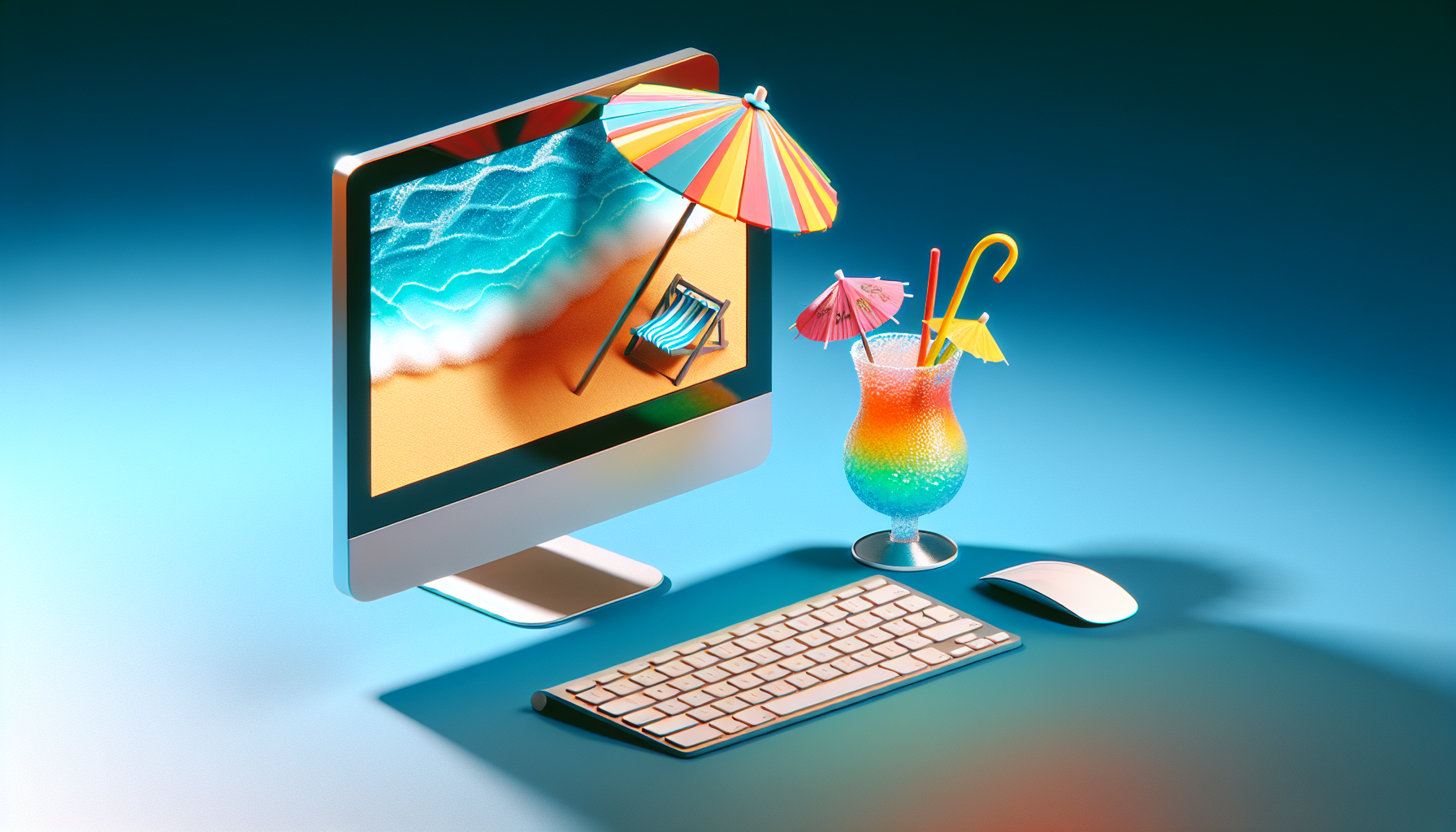
There are several reasons why managing your computer on a beach vacation is important. Here are a few:
-
Protect sensitive data from potential breaches
-
Mitigate security vulnerabilities by disconnecting from the internet
-
Conserve energy and reduce your carbon footprint
By taking these steps, you can ensure the safety of your data, reduce the risk of hacking, and contribute to a more sustainable environment.
Beyond data protection and energy conservation, managing your computer before you leave can prevent potential damage. Here are a few simple steps to secure your electronics before you go on vacation:
-
Unplug all devices from the power source to protect them from power surges and electrical issues.
-
Store your devices in a safe and dry place to avoid any physical damage.
-
Back up all important files and data to an external hard drive or cloud storage.
-
Set up automatic software updates and security scans to ensure your devices are protected while you’re away. By following these steps, you can enjoy your vacation without worrying about potential hazards such as system malfunctions or fire risks upon your return.
Devices to Unplug or Turn Off Before Leaving
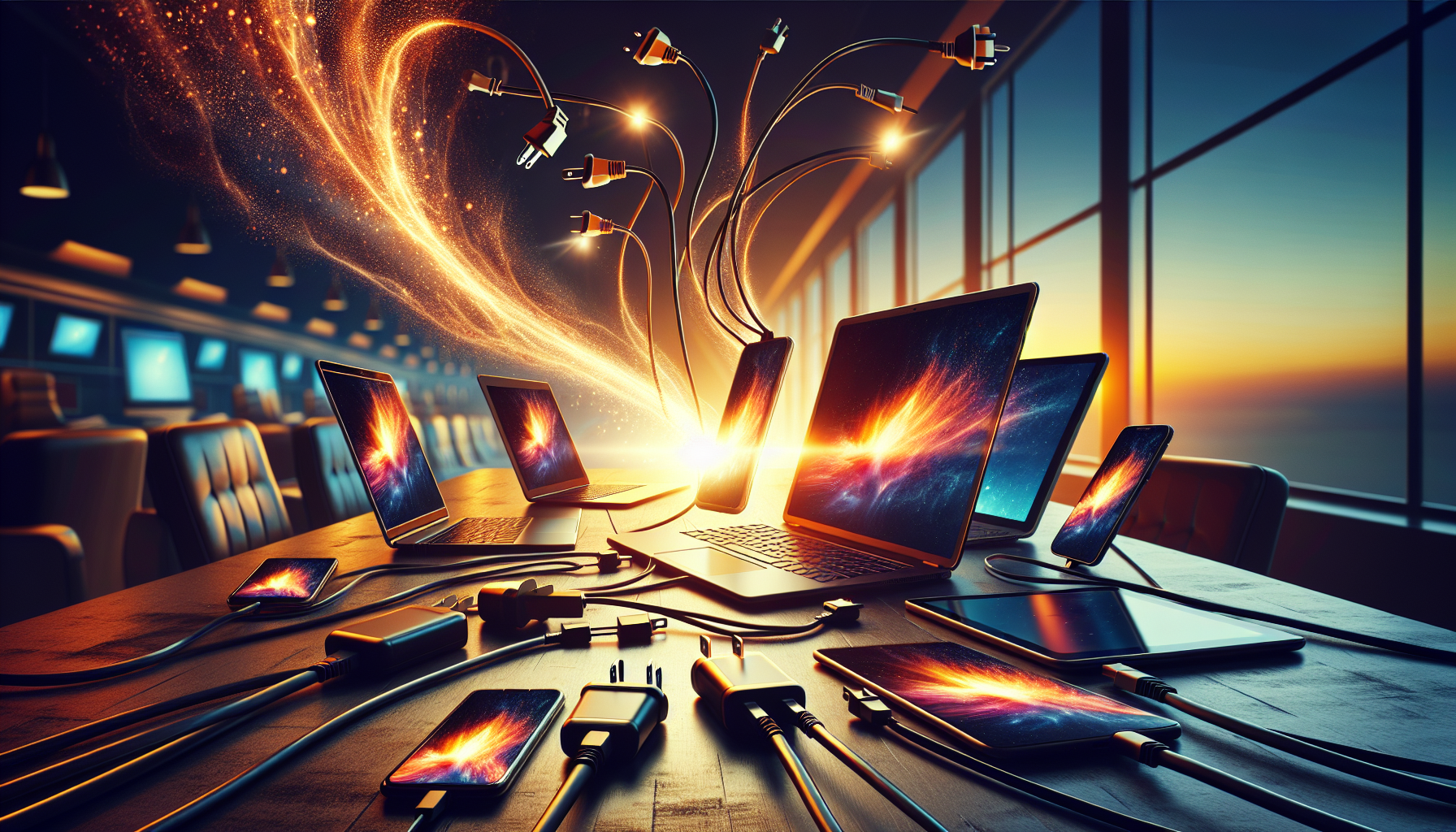
There are numerous benefits to unplugging or turning off electronic devices before embarking on your vacation. Here are some of the benefits:
-
It significantly cuts down on energy consumption, saving you money and reducing your carbon footprint.
-
It slows the wear and tear on components like cooling fans and hard disks, extending the lifespan of your devices.
-
Unplugging devices can protect them from power surges and reduce the risk of electrical fires.
Consider unplugging these specific categories of devices.
Desktop Computers and Related Accessories
Desktop computers and their accessories should be at the top of your list. Unplugging your desktop system, including the monitor, printer, and any connected peripherals, prevents potential damage from unexpected power surges. This simple action can save your machine from voltage spikes that could otherwise harm your computer’s components.
Besides, it aids in energy conservation, contributing to a more sustainable environment.
Laptops and Smaller Devices
Laptops and smaller devices like tablets and smartphones also need attention. Disconnecting these electronic devices from power sources reduces the risk of fire hazards, which are a major concern when you’re away from home. Properly managing these devices not only prevents catastrophic events like fires but also helps conserve battery life. Turning off these devices and unplugging them helps prevent unnecessary battery drain that could impact their performance upon your return.
Most people tend to overlook smaller devices, but they are just as important. Cell phones, tablets, and even certain smart home gadgets should be shut down and unplugged. This precaution minimizes the risk of appliance failures that might lead to electrical issues. Remember, a little caution goes a long way in ensuring that your home remains safe and your devices stay in top condition.
Non-Essential Smart Home Devices
Non-essential smart home devices, such as smart speakers or mood lighting, should also be unplugged. These devices consume phantom energy, also known as standby power, which can add up over time.
Unplugging these non-critical smart home gadgets can help reduce energy consumption and minimize risks during your vacation.
Devices to Leave On While Away
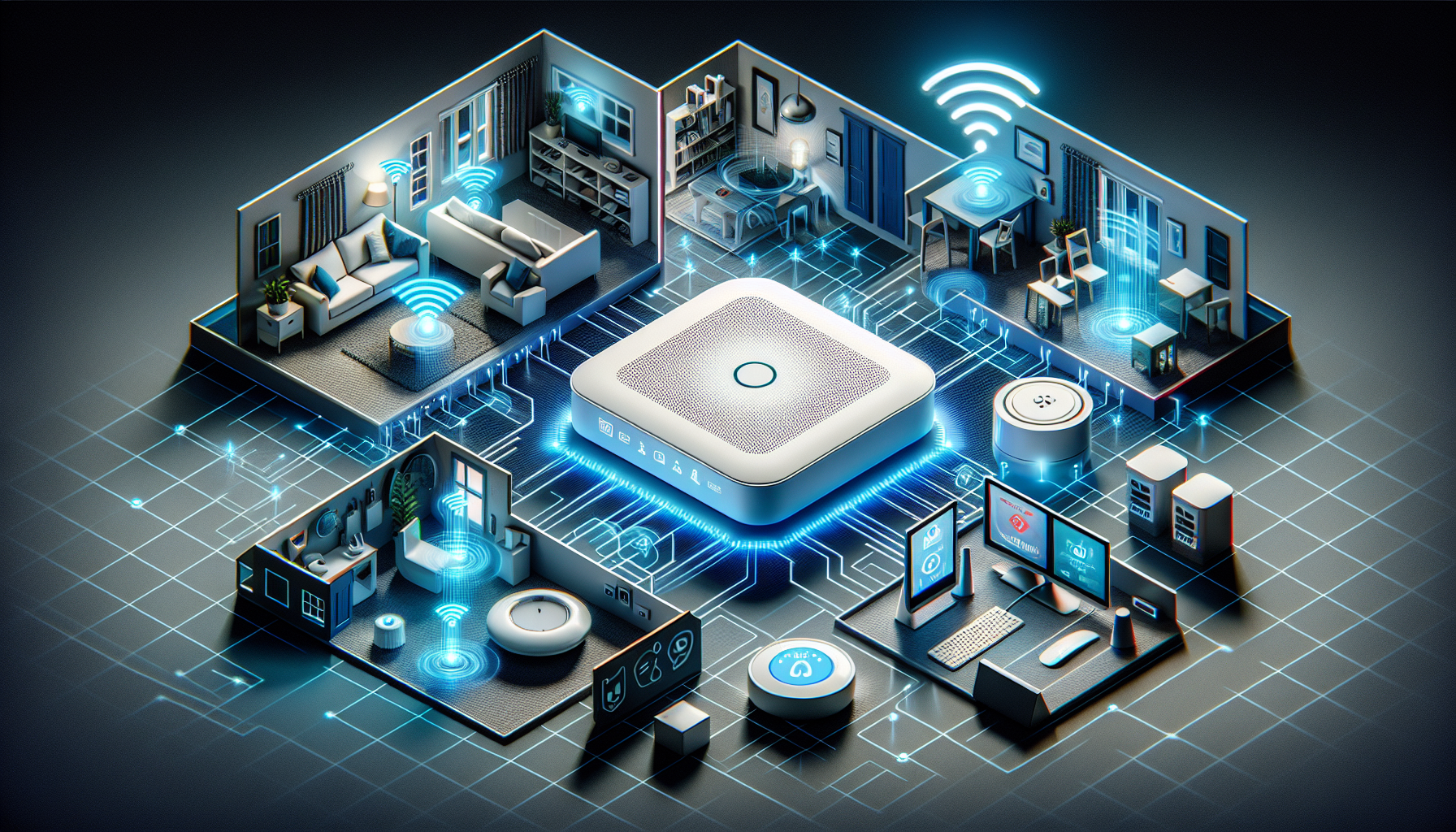
While many devices should be unplugged, some need to remain on to ensure essential home functions and security. For instance, leaving your Wi-Fi router and modem on can maintain connectivity with smart home devices and allow for remote monitoring.
Similarly, critical smart home systems and HVAC systems should stay operational to keep your home secure and in optimal condition.
Wi-Fi Routers and Modems
Keeping your Wi-Fi router and modem on is crucial for maintaining connectivity with other electronic devices in your smart home. This setup allows you to monitor home security systems remotely and check if the power is on.
Keeping the network active ensures peace of mind during your absence.
Critical Smart Home Systems
Critical smart home systems, such as security cameras and smart alarms, should always be left on. These devices offer continuous protection by providing constant surveillance and alerting you to any suspicious activities. Keeping these systems active can deter potential intruders and notify authorities in case of a breach, ensuring your home remains safe.
HVAC Systems and Sump Pumps
HVAC systems should be adjusted to maintain an optimal home temperature, rather than being turned off completely. This approach helps protect your home integrity by preventing issues like frozen pipes or humidity damage. Similarly, sump pumps must remain operational to prevent basement flooding during heavy rains or leaks.
Keeping these systems active could save you from potential catastrophes.
Tips for Keeping Your Computer Safe While Traveling
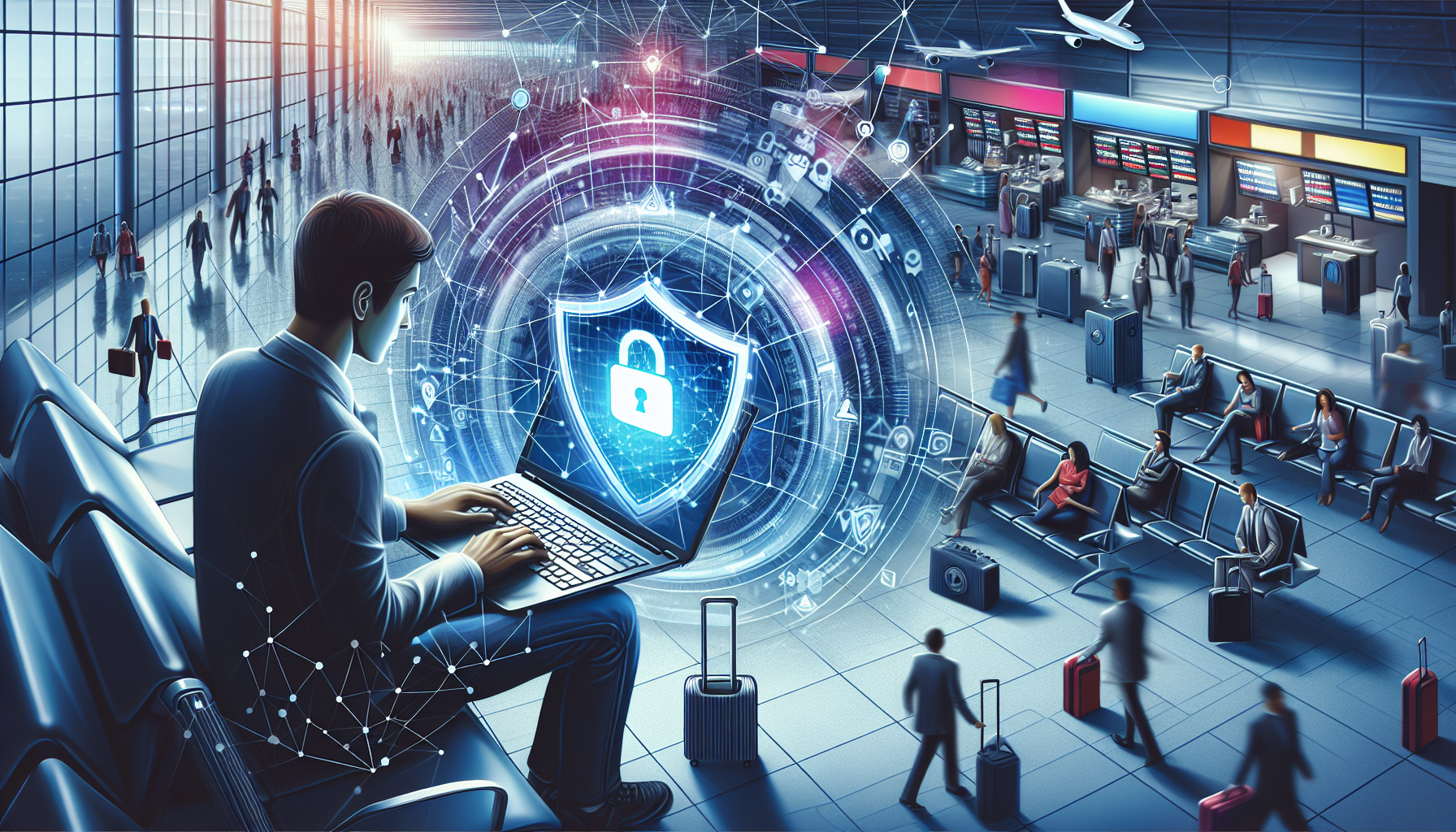
There are several precautions to take to keep your computer safe while traveling. Here are some tips:
-
Use a VPN when connecting to public Wi-Fi to secure and encrypt your online connections, protecting your personal information.
-
Install remote find and lock software to help locate and secure your device if it gets lost or stolen.
-
Avoid charging your devices in public places to prevent data theft through compromised ports.
By following these precautions, you can ensure the safety of your computer while traveling.
Use a VPN for Secure Connections
For data security, it’s critical to use a VPN when connecting to guest, free or public Wi-Fi networks. A VPN ensures that all your internet-bound traffic passes through secure servers, enhancing your privacy. This measure protects your data from potential breaches and keeps your online activities private, even on unknown network access points.
Remote Find and Lock Software
Installing remote find and lock software is a smart move to secure your device if it gets lost or stolen. This software can track your device’s location in real-time and even display a message for whoever finds it.
Some advanced tools can take a photo of the person using the cell phone, providing an extra layer of security and more answers to potential security concerns.
Avoid Charging in Public Places
To prevent data theft through ‘juice jacking,’ it’s recommended to avoid public charging stations. These compromised ports can steal data or install malware on your device. Instead, carry a portable power bank or use USB data blockers to ensure safe charging without the risk of data transfer.
Preparing Your Computer for Travel
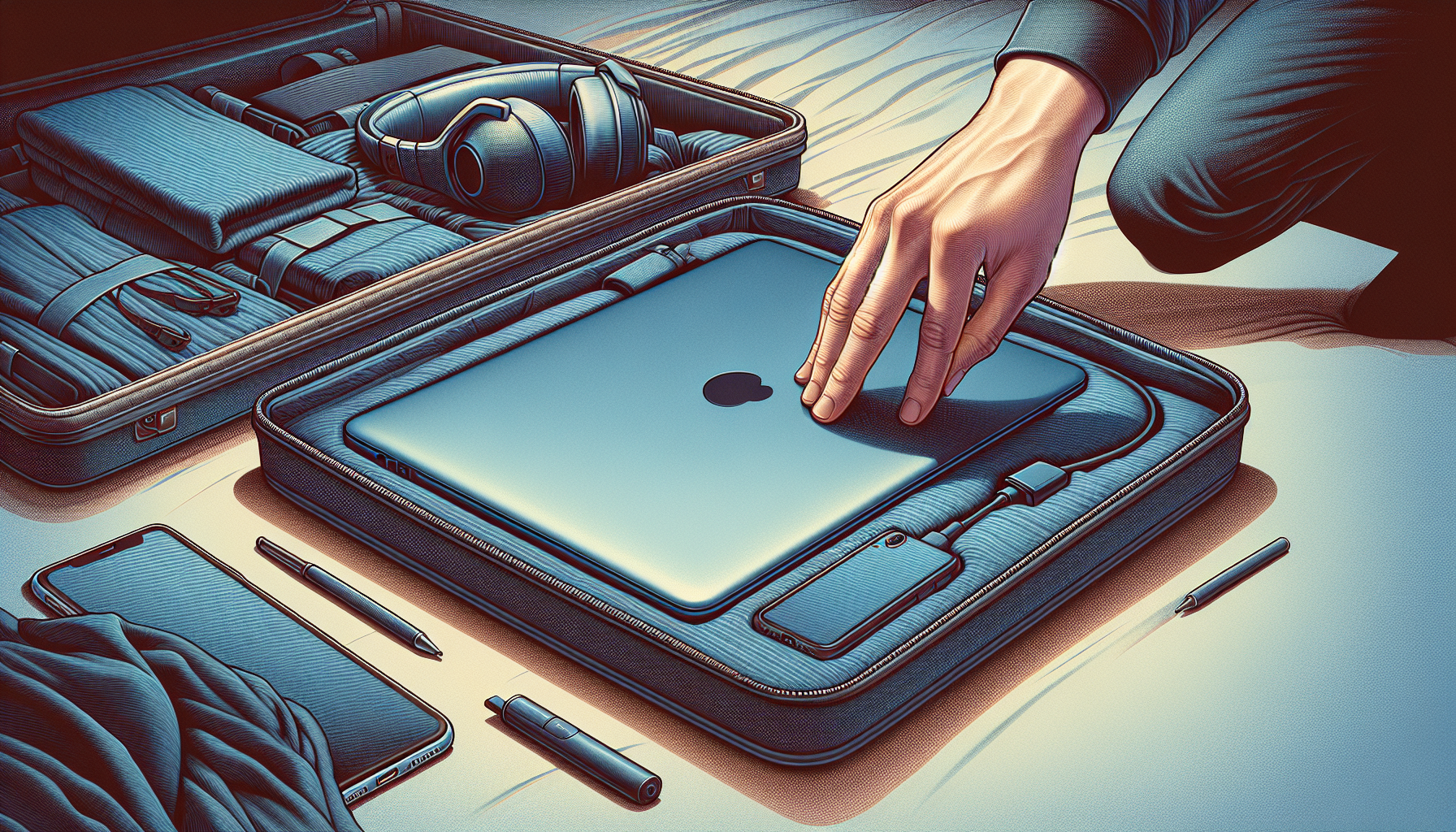
Computer preparation for travel consists of:
-
Backing up important data: This ensures you don’t lose important files if your device is lost or stolen.
-
Updating security software: This protects against potential threats.
-
Packing electronics with care: This helps prevent physical damage by using padded cases.
Backup All Important Data
It is crucial to back up all important data before traveling. This ensures that even if your device is lost or stolen, you can recover your sensitive data.
Cloud storage is a reliable option for backing up important files, offering easy access and security.
Update Security Software
To protect against potential threats, it is vital to:
-
Update your security software
-
Update your operating system and other systems
-
Regularly update your software to defend against vulnerabilities
-
Install any pending security patches.
Download the latest antivirus and spyware protection to keep your device secure while traveling, and consider using a surge protector to safeguard your device from power fluctuations.
Pack Electronics Carefully
Carefully packing your electronics can help prevent damage during travel. Use padded cases specifically designed for electronic devices and carry them in your hand luggage.
Avoid placing electronics in checked baggage to prevent pressure damage and reduce the risk of theft.
Adjusting Settings for Optimal Performance
Adjusting your computer settings before going on vacation can help conserve battery life and enhance overall performance. Apply energy-saving recommendations in system settings, such as reducing screen brightness and disabling auto-rotation. Additionally, manage connectivity features like turning off Bluetooth and Wi-Fi when not in use to save battery and reduce vulnerability.
Conserve Battery Life
While on vacation, it’s crucial to conserve the battery life of your electronic devices. Close unused applications and browser tabs to reduce battery drain. Enabling airplane mode when internet and other wireless communications aren’t required significantly reduces power consumption.
Adjusting screen brightness manually can also help save battery.
Manage Connectivity Features
To save battery life and reduce vulnerability, it’s essential to manage your connectivity features. Here are some tips:
-
Turn off Wi-Fi when not needed to conserve power and reduce connectivity-related usage.
-
Turn off Bluetooth when not needed to conserve power and reduce vulnerability.
-
This approach helps improve both performance and security, ensuring your device operates efficiently.
What to Do If You Can't Log In After Vacation
There are a few steps you can take if you’re unable to log in after vacation. Restart your computer and try entering your administrator name and password. If you don’t recall the password, leave it blank and click ‘Ok’.
You can also reset your password using a password reset disk or recovery tool.
Resetting Your Password
Various methods can be used to reset your password. Here are a few options:
-
Create a password reset disk beforehand to regain access by following prompts on the login screen.
-
Use a Windows password recovery tool.
-
Boot your laptop using a Windows installation disk to reset the password.
Using External Keyboards
Switch to an external keyboard if your built-in one is malfunctioning. Ensure the external keyboard is properly connected and recognized by your computer. Connect it using the appropriate port, either USB or Bluetooth, to regain access to your system.
Summary
In summary, managing your computer and electronic devices before heading on vacation is crucial for data protection, energy conservation, and preventing potential damage. Unplugging non-essential devices, keeping essential systems operational, and following security tips while traveling can ensure a worry-free vacation. By applying these best practices, you can enjoy your time away with the confidence that your home and devices are secure.
Frequently Asked Questions
Why should I unplug my desktop computer before going on vacation?
Unplugging your desktop computer before going on vacation conserves energy, protects it from power surges, and reduces the risk of electrical fires. It's a proactive way to ensure the safety and longevity of your device.
Can I leave my Wi-Fi router on while I'm on vacation?
Yes, you can leave your Wi-Fi router on while on vacation to maintain connectivity with smart home devices and enable remote monitoring of your home security systems.
What are some tips for conserving battery life on my laptop while traveling?
To conserve your laptop's battery while traveling, close unused applications, enable airplane mode, adjust the screen brightness manually, and consider using a dark theme for further battery savings. Safe travels!
How can I protect my sensitive data while traveling?
You can protect your sensitive data while traveling by using a VPN for secure connections, encrypting sensitive information, and avoiding charging your devices in public places to prevent data theft. Stay cautious and enjoy your travels worry-free!
What should I do if I can't log in to my computer after vacation?
If you can't log in to your computer after vacation, try resetting your password using a password reset disk or recovery tool, and consider using an external keyboard if the built-in keyboard is malfunctioning. Good luck!

